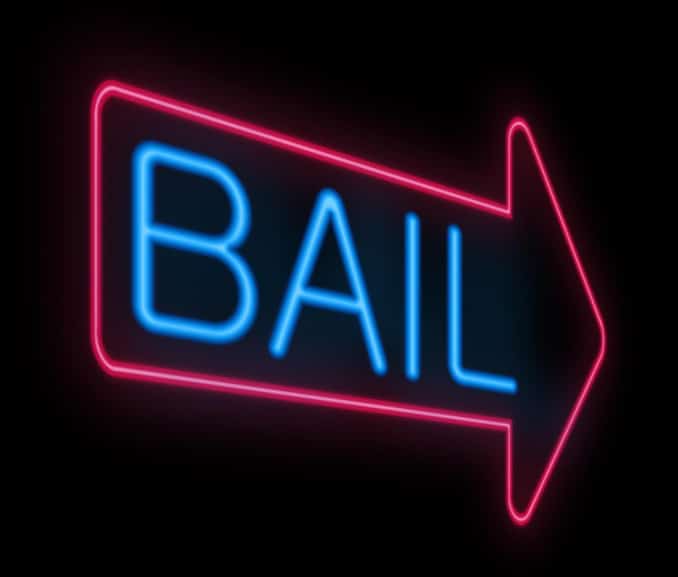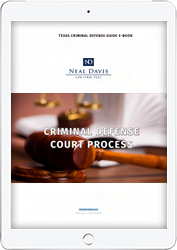If eligible for bail, how much is bond? Frequently asked questions about bond amounts and conditions.
Persons charged with a crime must know if they are eligible for bond and, if so, how much is bond? Houston criminal defense lawyer Neal Davis helps answer these questions below.
What is bail? What is bond?
First you should know what bail is, as well as what is a bond.
Courts set a bail amount for the conditional release from custody of arrested defendants facing a criminal charge. The main purpose of courts setting bail is to ensure that defendants will return to court for trial, yet without setting a bail amount that’s excessively high or oppressive.
When the court allows it, defendants alone can post bail, thus bailing themselves out of jail without sureties or other security such as a bondsman. This is called a personal recognizance bond, which is a pledge to pay further if the defendant fails to appear at trial.
For defendants who lack the funds to post bail, a bail bondsman or bail bond company can be engaged to provide a surety bond with the court, thereby pledging money as a promise that the defendant will return for trial. Typically, the bonding company charges a non-refundable 10 per cent of the total bond for this. Under this type of bond, the defendant pays money and provides the bondsman or bond company with collateral for the loan, such as a car or house. The bondsman then pays the court a portion of the bond and pledges to pay the full amount if the defendant fails to appear – at which point the defendant would forfeit his or her collateral to the bondsman.
When a defendant posts bail but fails to appear at trial, the bail amount is forfeited and normally is distributed to law enforcement agencies or the courts, depending on regulations. Also, when a defendant fails to appear, the bond is revoked and the bonding company often hires a bounty hunter to find the defendant and surrender him or her.
Not all bond amounts or bond conditions are fair to defendants. If you or a loved one faces such a circumstance, Houston criminal defense attorney Neal Davis has a track record of successfully reducing bonds or changing bond conditions. He has successfully appealed trial courts that have refused to follow the law and set reasonable bonds and conditions.
Posting bail or bond for pre-trial freedom is a common practice in the United States but is extremely rare throughout the rest of the world. One major reason for this is our judicial system’s presumption of innocence until proven guilty.
Am I eligible for bail or bond?
As for who is eligible for bail or bond, that depends on the individual’s circumstances. However, many defendants are eligible for bond. In fact, with few exceptions, the Texas Constitution provides prisoners with a right to bail before trial. A bail amount must be set by the court, and it may include certain bond conditions.
In the Houston area, Harris County District Courts set a bond schedule depending on the crime that is charged. This schedule isn’t a time frame but rather a list of dollar amounts which can be set for bond, depending on the criminal charge. The bond schedule recently has been challenged as being unfair and oppressive and is expected to be reformed at the least.
What are bond amounts?
As for what are bond amounts, that depends on the bond schedule of the courts.
In Texas, criminal charges can involve capital felonies, first, second or third degree felonies, and fourth degree or “state jail” felonies (Texas Penal Code § 12.04). In Harris County, bonds for such felonies can range from $2,000 for some fourth degree felonies to $50,000 for some murders.
For felony DWI (driving while intoxicated), defendants with a previous felony DWI conviction face double the bond amount for each previous felony DWI conviction. If the defendant had one previous felony DWI conviction, that would mean a $20,000 bond, or double the $10,000 bond amount set by Harris County District Courts for a felony DWI.

For all capital felonies and for some habitual or repeat offenders, Harris County District Courts set no bond, making such defendants not eligible for bond. Thus, eligibility for bond involves the nature of the criminal charge.
What are bond conditions?
To a limited extent, courts can impose bond conditions, as with felony appeals. These conditions can directly or indirectly relate to ensuring that the defendant continues to appear in court.
For instance, as a bond condition a court may require that a DWI defendant install a motor vehicle ignition interlock system in his or her vehicle and not be allowed to operate a motor vehicle without using such a device (which notes excessive blood alcohol content in order to prevent an engine from being started).
Or, for a defendant on pre-trial release or appealing a conviction of aggravated assault, a court may impose a bond condition that the defendant stay away from and not communicate with the victim.
A trial court has the discretion to revoke bond or bail if it finds enough evidence that a valid bond condition has been violated. Thus, meeting bond conditions is very important.
Continue reading about bond conditions.
Can you object to a bond amount or bond condition?
As for whether you can object to a bond amount or bond condition – yes, you can. Houston criminal defense lawyer Neal Davis has done that successfully in many cases.
Defendants who object to the amount of bond or a bond condition must state this objection in court, usually in the form of a motion or pre-trial application for writ of habeas corpus. The defendant, or his or her legal counsel, then must demonstrate that the court abused its discretion by imposing an excessive bond amount or bond condition.
Even in cases for which courts have discretion in setting bond amounts, they still cannot set overly excessive bonds. For capital murder cases, the Texas Court of Criminal Appeals never has allowed a bond amount approaching $1 million. In one such case, a bond set at $1 million was reduced to $50,000 by the appeals court.
Seek legal help from a criminal defense attorney for bond or bail
If you need legal help for bond or bail issues, please contact the Neal Davis Law Firm. Veteran criminal defense attorney Neal Davis and his experienced legal staff serve the Greater Houston area, including Pasadena, Baytown, Spring, Conroe, The Woodlands, Willis, Pinehurst, Sugar Land, Richmond, Needville and Cinco Ranch, as well as throughout Texas.
Contact us today for a legal consultation about your bond eligibility, bond amount or bond condition. We are here to help, 24/7. Simply call 713-766-1249 or use our online Contact form, and let’s get started.
Criminal Defense Court Process
FREE E-BOOKLearn all about the legal process and your legal rights.

